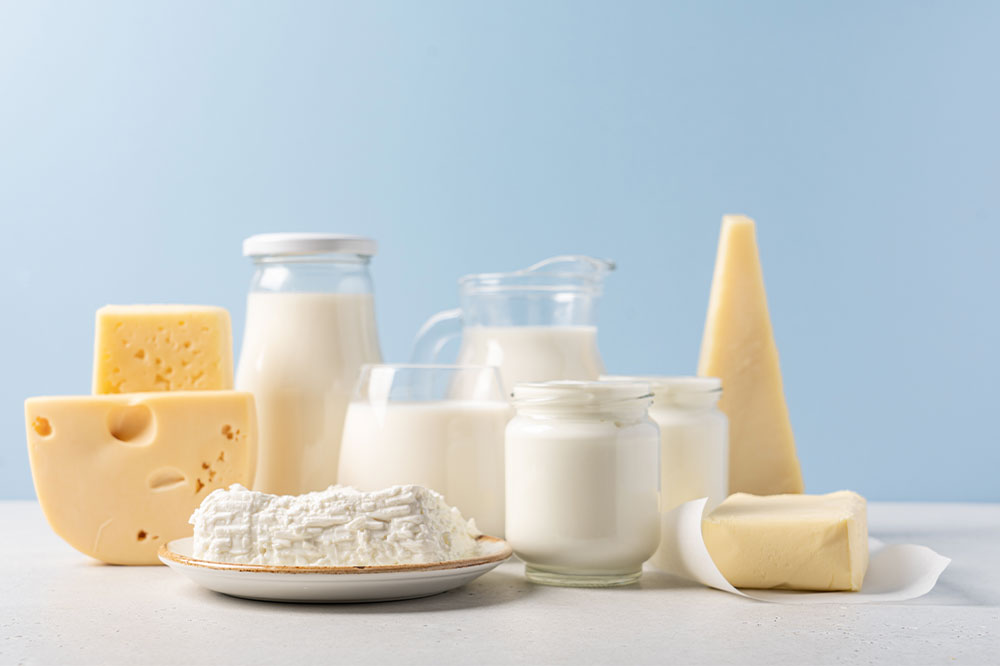6 foods that could help fight menopause symptoms

Menopause marks the end of the menstrual cycle. It is typically diagnosed when the individual has gone 12 months without their menstrual period. It is a natural part of life and is usually seen in individuals aged 40 to 50. Individuals may face several symptoms during menopause, including hot flashes, vaginal dryness, bloating, fatigue, and poor sleep. It could also affect emotional health. Read on to learn about foods that could help during menopause.
Dairy products
During menopause, there is a decline in the production of estrogen in the body. This can affect various functions, including bone repair and replacement. There can also be an increase in the level of bone loss during menopause which can lead to menopausal osteoporosis. Women who are undergoing menopause are also at high risk of fractures. Studies have found that one in two women over fifty years are at risk of osteoporosis-related fractures. What can help here is eating foods with high levels of vitamin D and K, along with calcium. This can help protect the bones and even help with bone development. A food source that is rich in vitamin D and calcium is dairy. Dairy and dairy products such as yogurt, cheese, and even butter are rich sources of calcium, phosphorus, magnesium, potassium, and even vitamin D, which makes them crucial to bone health. Studies have also found that individuals with a high vitamin D and calcium intake also had a reduced risk of early menopause.
Fatty fish
Essential fatty acids and healthy fats, especially omega-3, can go a long way when tackling menopause and its debilitating symptoms. Omega-3 fatty acids have been shown to benefit individuals who are undergoing menopause. They could help reduce the frequency of hot flashes and tackle night sweats, common symptoms of menopause. Many studies show how omega-3 fatty acids can help boost heart health and improve mood disorders. More research is needed to understand the effect of omega-3 and other healthy fats in menopause. But ensuring you get the right amount can help you test if it benefits you. Fatty fish such as salmon, herring, sardines, trout, and even mackerel are rich sources of omega-3 fatty acids. You can add them to your meals and try them baked or steamed to ensure that they make for a healthy food choice. If you do not eat fish, you can instead opt for nuts and seeds such as flax seeds, chia seeds, and hemp seeds which are also rich in omega-3 fatty acids.
Fruits and vegetables
Fruits and vegetables have a high content of vitamins and minerals. They also contain fibers and antioxidants that are essential for the body. Many food and health guidelines recommend having half your plate filled with fruits and veggies. When it comes to menopause, a few studies have found that eating more vegetables and fruits and adding more fiber to your meals can reduce the frequency of hot flashes. It also could help improve overall health. Cruciferous vegetables may also be helpful post-menopause. While more research is needed to fully understand and support this finding, some research found that eating broccoli can help reduce estrogen, which is linked to cancer. Eating fruits and vegetables can also help tackle oxidative stress, promote better sleep, and even help tackle depression. You can add leafy veggies such as kale, collard greens, cabbage, and cruciferous vegetables such as cauliflowers, broccoli, and even brussels sprouts to your meal. You can also try blueberries and grapes as a snack.
Soy bean and soy milk
Soy Bean, soy milk, edamame, miso, and even foods such as tofu and tempeh can help with symptoms of menopause. A small study with a group of 38 individuals found that having a soy-rich, vegan meal plan helped to reduce symptoms such as hot flashes by 79 percent. Although extensive research is needed to understand how soy can help with menopause, adding it to your meals can do no harm. Of course, you can check with your healthcare practitioner if this is safe for you before adding it to your meals.
Oats
Whole grains, such as oats, barley, wheat, brown rice, and even popcorn, contain tons of essential nutrients, including vitamin B and fiber. Vitamin B can help regulate the nervous system and even boost your mood. The fibers can help maintain good digestive health and bowel movements. Whole grain foods can also lower of risk of cardiovascular conditions and improve heart health. While these foods do not directly help with menopause or its symptoms, they can help maintain good health, which is essential during and post-menopause.
Water
Water is another food that is important to have during menopause. It helps fight several menopause symptoms, including vaginal dryness and bloating. It can also help improve the skin and fight thirst, muscle cramps, fatigue, and confusion commonly seen with dehydration. There is no personalized guide on how much water is good for you. You can check the color of your urine to see if you’re drinking sufficient water throughout the day. If the urine is a deep yellow, you probably need to drink more water. You can also get your water content from foods such as watermelon and strawberries.